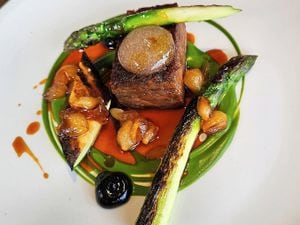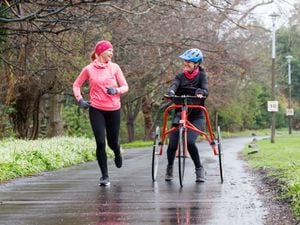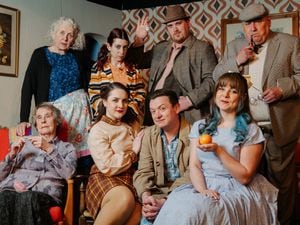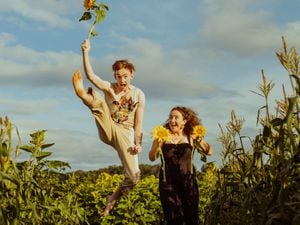80s icon Howard Jones is back in Brum tonight
These days, it’s fun, as much as anything else. Howard Jones is back on the road for a 13-date tour of the UK, which includes a headline show at Birmingham Town Hall tonight.
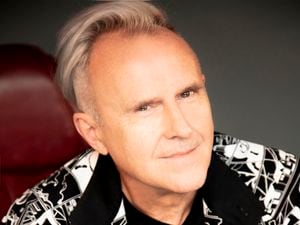
He’ll be joined by his good mates, Nick Beggs and Robin Boult, as they present an intimate, stripped-down trip through Howard’s colourful 40-year music career.
The acoustic shows will highlight a fresh take on Howard’s best-known hits and will provide a rare and intimate opportunity for the audience to hear first-hand about the inspiration behind Howard’s beloved material, plus fascinating recollections from his international touring career.
Hailed by many as an electronic music pioneer, Howard Jones has been a constant presence on the international touring scene for the past three decades, playing live in several configurations including intimate solo shows and dates with his full high-tech band set-up. His most recent album, the Top 40 album Transform, is his first new studio album in nearly a decade. Originally released in 2019 to critical acclaim, Transform features several collaborations with electronica luminary BT.
“I am really excited about the trio tour we have planned for 2022,” says Howard. “Nick and Robin are dear friends and world-class musicians and I love performing with them. After touring the trio in America, I thought the time was right for us to bring the fun of this acoustic show back home. I will play a range of songs from the Hojo canon including the hits old and new as well as some deep cuts and fan favourites.”
Howard Jones first burst upon the contemporary music scene in 1983, with his very English song-writing and pioneering synthesizers. His first two albums Human’s Lib and Dream into Action were worldwide hits. Human’s Lib #1 in 1984 in the UK and featured the hits New Song, and What Is Love? In 1985, Jones released the follow-up, Dream into Action, which quickly became a Top Ten Platinum album in North America. It featured the smash hit singles Things Can Only Get Better, Life In One Day, No One Is To Blame, and Like To Get To Know You Well. Howard Jones has sold over eight million albums worldwide and continues to make new music and tour the world. He recently performed on NBC’s top-rated morning and night-time television shows respectively, Today and The Tonight Show (the latter hosted by Jimmy Fallon).
Such acoustic work has, of course, been part of Howard’s canon since the earliest days. “Right at the beginning, I used to play Hide and Seek at the piano and maybe something like Don’t Always Look At The Rain. It’s always been part of what I’ve done.
“Going out there and playing to people is what I do and I love doing it. It’s my role that I play. That’s what I’m hopefully reasonably good at. That’s what I have to offer in this life, as a human being. Sitting at home doesn’t suit me.”
Howard will next year celebrate the 40th anniversary of his breakthrough album, Human’s Lib. He wanted to be a pop star as a boy. “I always wanted to make records and tour. Ever since being a young child I dreamed of being a pop star or rock star. When you are young, you don’t realise what that means. The reality is very different to how you imagine it’ll be, but the reality suited me really well. I had an incredible start in the 80s and then I became an independent artist.”
He was in bands from the age of 14 and had been developing his one-man show with his performance artist, Ged, for some years, before breaking through. “We’d been doing three or four shows a night. I’d built up my own following from nothing and would take three coachloads of people per show. I’d had that preparation for it not being an easy life. I’d understood what the pressure was like. I was older, 28, before I got signed, so I was ready.”
Howard didn’t have guitars or a drummer and was using new technology in a way that others hadn’t. “Rock’n’roll is the most conservative industry you could ever come across. It doesn’t really like anything new or anyone shaking things up. When it happened, I realised it would make me stronger to constantly have to be defending what I was doing.”
He’d started playing piano at the age of seven before joining bands at 14. After achieving success with Human’s Lib, his main worry was that he’d blow it. “I was worried I wouldn’t have the songs ready for the second record. That anxiety was the only thing that was tough for me, really. I think it was difficult to deal with the attention because I didn’t seek it, I just wanted to do my music. What comes with that, of course, was a massive spotlight. There was a part of me that really enjoyed it and I was doing all the things I always wanted to do. At the same time, there was anxiety that it might end. I think the key is to enjoy it. You don’t have to make it last forever. It’s pop music and the spotlight turns to someone else.”
There was a crucial moment at the beginning of the 90s where he’d done five albums for Warner Brothers. He’d sold a lot of records and done pretty well but they didn’t want to renew his contract and he thought that was the end, he’d be finished.
“I didn’t know what I’d do next. I suddenly realised that was the best thing that could happen. I could record my own records, book my own tours and become an independent artist. The internet was exploding and I could carve out an independent career. The 1980s was looked upon as a dreadful era of music. People didn’t want to know about anything to do with the 80s. Now we’ve arrived in this new millennium and suddenly there’s a huge resurgence and it’s regarded as a cool time for music after all. You never know what’s going to happen.”
Being an independent artist allowed him to record at his own leisure and a beautiful series of records – Engage, Transform, and Dialogue, followed from 2015 to the present.
“It takes me a long time to make these records. I know I won’t be selling millions of them and the reach is much smaller.
“But I don’t want to disappoint any of my fans at all. I want these to be brilliant records, with no expense spared. This is what you leave behind. Those recorded works will be there forever. You have to make sure they are pristine and the best that you can do.
“That’s been my policy as an artist and I feel that my fans have appreciated that over the years. I’ve been consistent with my recorded work.”
In addition to Engage, Transform, and Dialogue, there have also been stunning records – Piano Solos (For Friends And Loved Ones) on a semi-regular basis. The first came in 2003, with the follow-up in 2006. Another is due. “There’s three strands to my work. There’s the electronic stuff, the soul-based stuff, then the piano solos.
“I’ve got another piano solos record to come next year. I’ve got this new piano that I can play into it and it remembers what you play and it plays an edit back to you via the iPlayer. That opens up a whole new world of piano composition to me.”
He continues to listen to new music by other artists, too, to keep in the loop. “I think it’s really important to listen to other artists and I probably don’t do enough of that. I get exposed to new music through my kids, who are from the streaming generation and have incredibly eclectic tastes, from grime to Ella Fitzgerald. Then Robbie Donovan, who I’ve worked with for two or three decades, is always introducing me to new music.
“With this new piano, I can listen to classical music played by the great pianists. I went to see Andrea Bocelli the other weekend. I saw the Abba show, too. I keep my brain open to new things. It’s important to keep your ears open.”
Most of all, though, he loves playing live. And that’s why he’s looking forward to his present tour.
“The interaction with fans is a wonderful thing. It was interesting seeing the ABBA show, which was wonderful, but it wasn’t a live person on the stage. Their soul wasn’t there. That’s what I missed and that’s what people go to a show for. The person is there with you. There’s this unique communication that goes on at all sorts of levels between the audience and the artist. It’s an incredible thing to be part of. The audience is so much a part of the show. And they move and they are vibed. That’s what makes a show.
“I feel privileged to do this. I think I appreciate it more over time. I’ve become less afraid of really being myself on stage. I still get nervous before shows, but I feel more confident about really being myself on stage so that I can give everything I’ve got. It’s a journey.”

